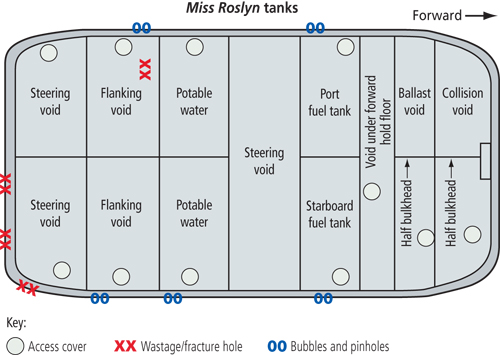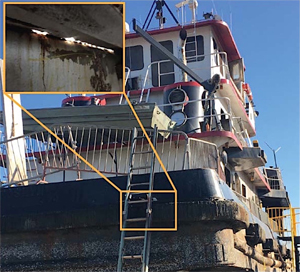Miss Roslyn limped down the Mississippi River with a pronounced starboard list that worsened as water washed over the aft deck. The captain knew the towboat wouldn’t make it five miles farther for a crew change.
He took the advice of a fellow Marquette Transportation captain who suggested crossing the river to shallower, calmer water along the east bank. Miss Roslyn came up against an empty barge near the bank minutes before rolling over. All three crew escaped before the vessel sank at mile 142 in Reserve, La.
Investigators later attributed the sinking, which occurred on Oct. 9, 2018, at about 1700, to maintenance lapses by Marquette Transportation’s Gulf-Inland division, which operated the 40-year-old vessel.
“The severe wastage found throughout the vessel in the post-accident survey indicates that the Miss Roslyn was poorly maintained,” the National Transportation Safety Board (NTSB) said in its accident report.
Marquette’s Gulf-Inland unit, the report noted, “did not have an effective maintenance program on board the vessel, so holes in and fractures to the hull and deck went undetected and ultimately led to flooding while the vessel was conducting normal operations.”
The NTSB did not specifically consider the actions of Miss Roslyn’s captain during the final minutes before the towboat sank. A committee of Marquette port captains, however, reviewed the incident and determined the 40-year-old captain should be fired.
Miss Roslyn swapped crews at the Cooper Consolidated Upper Reserve fleeting area at about 0500 on the day of the incident. It spent the day building tows at a fleeting area about seven miles upriver. For much of that time it was broadside to the current, holding barges in position. The towboat left at 1600 that afternoon for a 1700 crew change.
The captain recognized the towboat listing more than usual to starboard during the return voyage. Deck hands discovered a dry engine room but 4 to 6 inches of water washing over the aft starboard deck. The water prevented them from opening hatch covers to check void spaces, although the captain ordered them to dewater the port steering and flanking voids with a portable pump.
 |
|
This diagram details the estimated position of the holes found in the hull and deck during a tank compartment air test after the sinking. |
|
Pat Rossi illustration |
Miss Roslyn’s captain sought help over the radio. The captain of the Marquette towboat Joanne Marie responded that the stricken vessel likely wouldn’t make it back to Cooper Consolidated. He suggested crossing the river to safer water despite the 4.7-knot current. According to the NTSB report, Miss Roslyn’s captain felt confident the vessel would make the half-mile crossing. The good Samaritan towboat Kristy Dutsch followed closely behind, and Joanne Marie was nearby.
Within a minute, Miss Roslyn’s list worsened until the starboard bulwark was underwater. The towboat started slowly rolling to starboard as it approached an empty fleet barge on the east bank. Two deck hands escaped to the fleet barge while the captain jumped from the stern onto Kristy Dutsch, where a crewman captured images of the capsizing.
Salvage crews refloated the towboat within a week. Tests conducted by a marine surveyor showed “severe wastage” throughout the vessel, which last was dry-docked in June 2017. Problems included “a fractured seam in the hull to the starboard steering void, and a fractured deck plate on the stern deck above the port flanking void,” NTSB investigators said. Bubbles and pinholes were located along several port and starboard tanks.
Federal investigators said the scope of the wastage, and the fact that it was presumably undetected, suggested problems with Marquette’s upkeep efforts.
“An effective maintenance program would have prevented the holes from forming and made identification of hull fractures easier to see and flag for repair, or helped to determine when the vessel had outlived its useful service life,” the NTSB said.
Marquette Transportation did not respond to a request for comment. Miss Roslyn, valued at $1.1 million, was a total loss.
The NTSB considered fatigue when investigating the captain’s decision-making. The report noted the captain lived 70 minutes from work. Combined with a 12-hour shift, the captain’s workday approached 14.5 hours. He got about six hours of sleep each night.
Marquette is part of American Waterways Operators’ Responsible Carrier Program that requires operators to adhere to industry best practices. Marquette has a health and safety plan that considers employees who work more than 14 hours per day “a high risk for crew fitness.” However, it does not include commutes in that calculation.
Details about the captain’s departure from Marquette were not available. He was no longer working for the company when interviewed by the NTSB.

